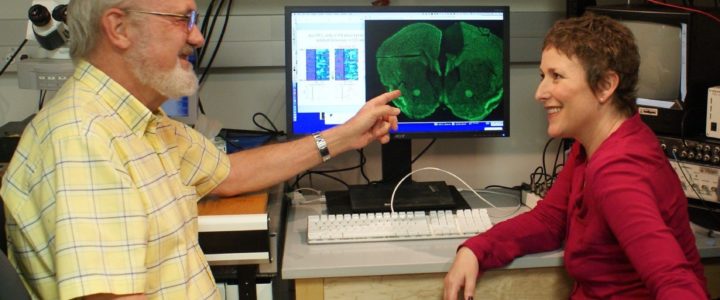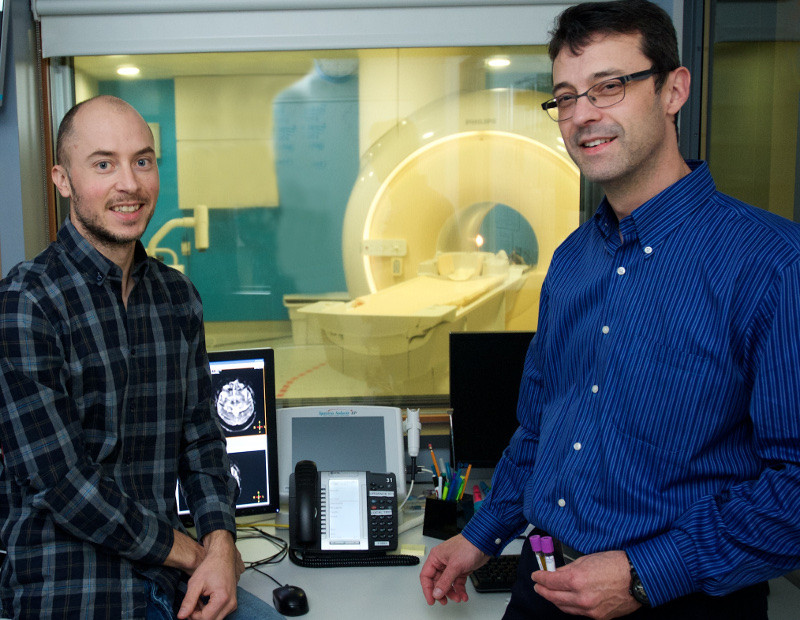With a $66,714 grant from the FRAXA Research Foundation awarded over 2015-2017, Dr. Francois Corbin at the Universite of Sherbrooke will test the safety and synergistic effects of lovastatin and minocycline in patients with Fragile X syndrome.
Read more2016 Grants
FRAXA Drug Validation Initiative (FRAXA-DVI)

The FRAXA Drug Validation Initiative (FRAXA-DVI) provides speedy, cost-effective, objective preclinical testing of potential Fragile X treatments. FRAXA-DVI uses in-vitro systems, behavior batteries, and gene expression and peripheral biomarker platforms to validate investigational new drugs and repurposed available compounds in Fragile X syndrome (FXS).
Read moreNovel Modulators of Potassium Channels to Treat Fragile X

With funding from FRAXA over 2015-2017, the Yale University team of Leonard Kaczmarek, PhD showed that the firing patterns of auditory neurons in response to repeated stimulation is severely abnormal in Fragile X mice. Based on these results, they are collaborating with the UK-based company Autifony to develop advanced compounds which may reverse these deficits.
Read moreResearch Points to Drugs which Inhibit PDE to Treat Fragile X

FRAXA Research Foundation funded a grant of $90,000 over 2016-2018, for a postdoctoral fellowship for Thomas Maurin, PhD, working under the mentorship of Dr. Barbara Bardoni at INSERM in France. The team works on the biochemistry of the Fragile X protein. They have found that PDE inhibitors (a class of drugs) show promise as treatments for Fragile X syndrome. In related research, FRAXA is currently funding a clinical trial of PDE4D inhibitors.
Read moreNKCC1 Inhibitor Bumetanide Corrects Synaptic and Circuit Hyperexcitability in Fragile X Mouse Model

With $258,000 in grants since 2013 from FRAXA Research Foundation, Dr. Anis Contractor and Dr. Qionger He at Northwestern University are exploring the potential of the available drug bumetanide to correct altered GABA signalling in a mouse model of Fragile X syndrome.
Read moreRepurposing Study II: Evaluating Combinations of Drugs to Treat Fragile X

FRAXA Research Foundation initially partnered with Healx in 2016 to identify existing drugs with potential to treat Fragile X syndrome, using machine learning algorithms and computational biology. The study produced results, and now FRAXA and Healx have launched a new round of studies to evaluate combinations of compounds, including both drugs and natural products.
Read moreCombinatorial Drug Treatment in a Model of Fragile X Syndrome using Novel Biomarkers

With a $90,000 grant from FRAXA Research Foundation awarded over 2016-2017, University of California researchers Khaleel Razak, PhD, and Jonathan W. Lovelace, PhD, are exploring drug combinations to limit hypersensitivity to sounds in Fragile X mice.
Read moreTargeted Transcriptional Reactivation of FMR1 in Fragile X Syndrome Stem Cells

With a $90,000 grant from FRAXA Research Foundation awarded in 2016, University of Michigan researcher Peter Todd, MD, PhD, is using CRISPR to selectively turn the Fragile X gene back on in stem cells.
Read moreInvestigating Gene Reactivation to Treat Fragile X Syndrome

With a $180,000 grant from FRAXA Research Foundation from 2016-2017, Dr. Jeannie Lee and her team at Harvard are working to reactivate the gene that is silenced in Fragile X syndrome.
Read moreMechanisms of Tolerance to Chronic mGluR5 Inhibition

Over the past few years, both Novartis and Roche sponsored large-scale clinical trials of metabotropic glutamate receptor 5 (mGlu5) negative allosteric modulators (NAMs) to treat Fragile X syndrome (FXS). With a $90,000 grant from FRAXA Research Foundation in 2015-2017, Dr. Mark Bear’s team will explore if mGlu5 NAMs dosed chronically causes tolerance, and if so, how it develops and to probe new avenues to prevent or circumvent it.
Read morePrefrontal Cortex Network (PFC) Dynamics in Fragile X Syndrome

With a $90,000 grant from FRAXA Research Foundation from 2016-2017, Dr. Daniel Johnston and Dr. Jenni Siegel at the University of Texas at Austin are analyzing pre-frontal cortex (PFC) dysfunction in the Fragile X model. They have preliminary evidence that Fragile X mice are severely impaired in a prefrontal cortex (PFC)-dependent task.
Read moreAltered Neural Excitability and Chronic Anxiety in a Mouse Model of Fragile X

With a $35,000 grant from FRAXA Research Foundation in 2016, Dr. Peter Vanderklish at Scripps Research Institute, and colleagues, explored the basis of anxiety in Fragile X syndrome.
Read morePreclinical Testing of Sleep-Wake Patterns as an Outcome Measure for Fragile X

FRAXA Research Foundation awarded $122,000 over 2016-2018 to Dr. Cara Westmark at the University of Wisconsin at Madison for studies of sleep disorders in Fragile X syndrome.
Read moreWhich is the right FMRP for Therapeutic Development of Fragile X Syndrome?

With a 2-year, $90,000 grant from FRAXA Research Foundation over 2016-17, Dr. Samie Jaffrey at Weill Medical College of Cornell University explored which FMRP isoform is the best target to treat Fragile X syndrome.
Read moreBiomarker Discovery and Validation for Fragile X Syndrome

With a $120,000 grant from FRAXA Research Foundation over 2015-2016, Dr. Eric Klann of New York University investigated potential new biomarkers in Fragile X syndrome and how to translate these markers from mouse models to human patients.
Read moreFunction of FMRP and Test of a Novel Therapeutic Approach in a Fragile X Mouse Model

With a 2015-2016 $90,000 grant from FRAXA Research Foundation, Dr. Herve Moine and Dr. Andrea Geoffroy aim to uncover the exact role of FMRP and to test a novel possible means to correct for FMRP absence in the mouse model of Fragile X syndrome.
Read moreCorrecting Defects in Astrocyte Signaling in Fragile X Syndrome

With a $90,000 grant from the FRAXA Research Foundation from 2015-2016, Dr. Laurie Doering and Dr. Angela Scott at McMasters University studied astrocytes in Fragile X. Astrocytes, brain cells which support neurons, do not transmit signals. Several treatment strategies for Fragile X have been proposed based on correction of “astrocyte phenotypes”.
Read moreSensory Hypersensibility in Fragile X Syndrome and BK Channel Openers

With $366,100 in grants from FRAXA Research Foundation, these investigators at the University of Orleans studied sensory abnormalities in Fragile X mice and test the ability of a class of drugs, BK channel openers, to rescue these abnormalities.
Read moreFragile X Mutant Mouse Models

With $375,000 in grants from the FRAXA Research Foundation since 2009, Dr. David Nelson has developed an impressive array of advanced mouse models of Fragile X, at Baylor College of Medicine. These models are available to investigators worldwide on request. This resource has been essential for a broad, rapid distribution of Fragile X and related gene mouse models and has increased the pace of Fragile X research.
Read moreMicroRNAs as Biomarkers in Fragile X Syndrome

With a $90,000 grant from FRAXA Research Foundation in 2015-2016, Dr. Mollie Meffert and Dr. Christina Timmerman at Johns Hopkins University studied groups of small RNAs, known as microRNAs, which are greatly decreased in brain tissue of Fragile X mice vs. normal controls.
Read moreRepurposing Drugs to Dampen Hyperactive Nonsense-Mediated Decay in Fragile X Syndrome

With a $90,000 grant from the FRAXA Research Foundation, Dr. Lynne Maquat and Dr. Tatsuaki Kurosaki will investigate nonsense-mediated mRNA decay (NMD) in Fragile X. NMD is a “housekeeping” process that cells use to prevent faulty proteins from being made. But there is too much of it in Fragile X syndrome. There are already available drugs that suppress NMD – including caffeine.
Read moreAltered Sleep in Fragile X Syndrome: Basis for a Potential Therapeutic Target

With a $90,000 grant from FRAXA Research Foundation over 2016-2018, Dr. Carolyn B. Smith and Dr. Rache Sare at the National Institute of Mental Health investigated the basis of sleep problems in Fragile X syndrome.
Read moreEnhancement of NMDA Receptor Signaling for the Treatment of Fragile X Syndrome

FRAXA Research Foundation funded a 2016-2017 Fellowship for Dr. Stephanie Barnes in the University of Edinburgh lab of Dr. Emily Osterweil. With this $90,000 award, the team is investigating NMDA signaling in fragile X syndrome mice.
Read moreAbnormalities of Synaptic Plasticity in the Fragile X Amygdala

With a $110,050 grant from FRAXA Research Foundation from 2005-2016, Dr. Sumantra Chattarji at the National Center for Biological Sciences researched how the amygdala is affected by Fragile X syndrome. Results published.
Read moreFRAXA Grant to Nahum Sonenberg, PhD — Effects of metformin in Fmr1 knockout mouse model of Fragile X syndrome

Mis-regulation of activity-dependent protein synthesis is one of the major cellular abnormalities found in Fragile X. Upstream neuronal signaling regulates a large cluster of enzymes called the mTORC1 complex, which in turn regulates protein synthesis. This complex is also controlled by cellular energy levels via the metabolic sensor AMP-activated Protein Kinase (AMPK). AMPK is a highly conserved kinase that is activated under conditions of energy stress, when intracellular ATP levels decline and intracellular AMP increases.
Read more
